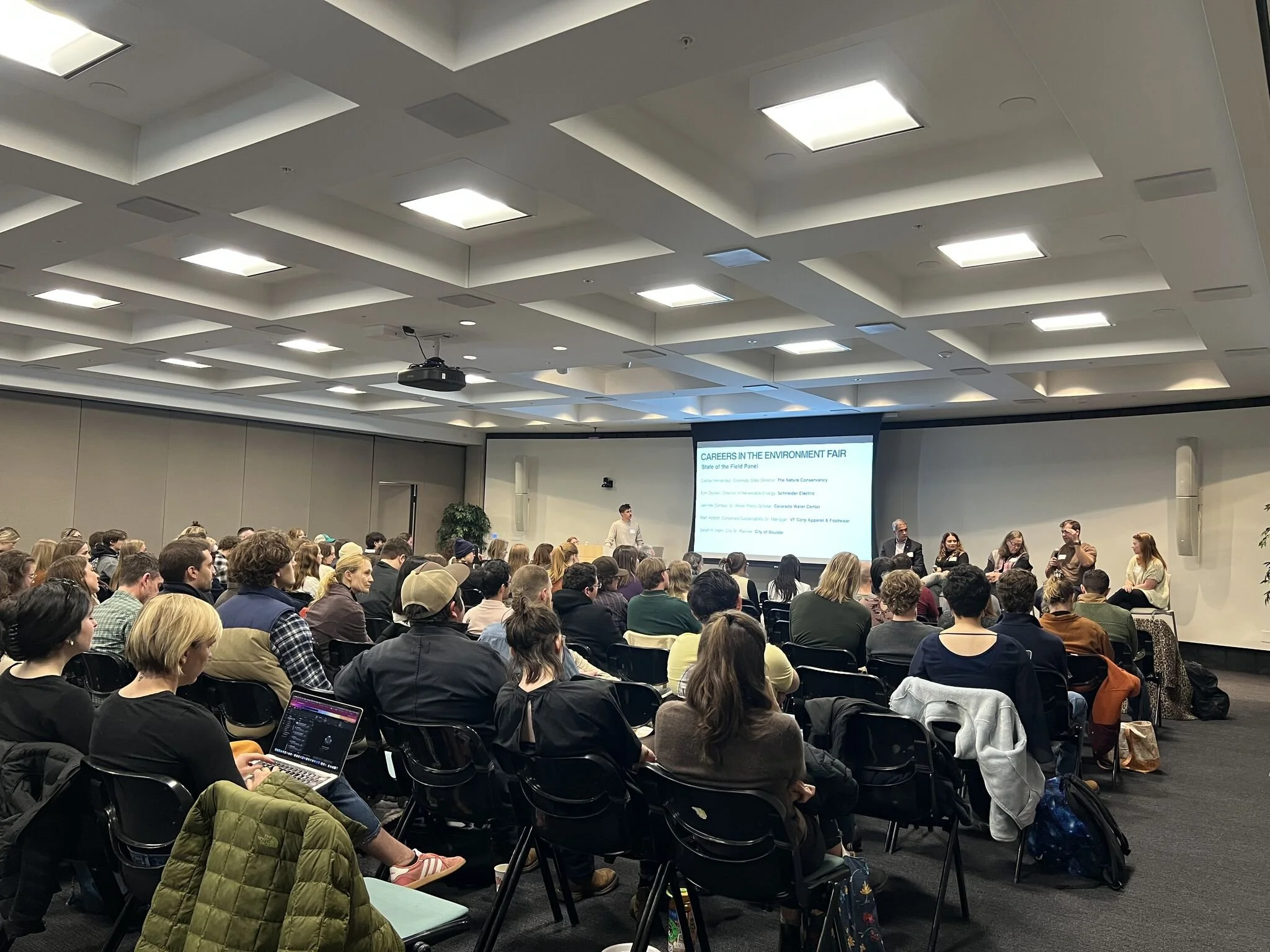Teaching
Warren moderating the panel State of the Field: Jobs and Sustainability at the 2025 Careers in the Environment Fair.
Representatives from Nature Conservancy, Schneider Electric, Colorado Water Center, VF Corp, and the City of Boulder.
Student on CITE Committee introducing industry professionals to ENVS students at a CITE talk.
Warren values the classroom as a learning opportunity for himself and his students to foster hopeful, creative, and counter-hegemonic thinking to address environmental problems.
Warren’s early teaching experience was as an undergraduate at the university writing center, where he was trained by Chris LeCluyse to conduct non-directive, collaborative, one-on-one consultations with students across the curriculum. At the same time, Warren developed a deep commitment to interdisciplinary, problem-posing pedagogy thanks to his time learning from the radical, entirely team-taught, and entirely interdisciplinary curriculum of the Westminster Honors College (explained by founding-dean Badenhausen, with a nod to Warren, here).
Warren soon after started working at two community writing centers, where he conducted in-person and at-home consultations for people with disabilities and severe trauma as well as taught workshops on personal, practical, and civic writing for community shelters, underserved K-12 after-school programs, and jail and prison writing programs. These experiences convinced him of the now-legendary SLCC CWC’s motto: everyone can write.
At the University of Colorado Boulder, Warren continues to seek out innovative teaching methodologies. He has been fortunate to learn from faculty and teach courses within Communication, Environmental Studies, CU Upward Bound for Native American Youth, and the Program for Writing & Rhetoric. In 2021, he was inspired by a summer fellowship on carceral systems with the Just Transition Collaborative and by faculty in Ethnic Studies (shout out to mentors Clint Carroll and Jennifer Ho) to adopt contract grading into his classroom as a restorative justice approach to student evaluation. In 2022, he was competitively selected by faculty to serve as a Lead Graduate Teacher fellow with the Center for Teaching and Learning and was later recognized with teaching awards from both the Communication Department and CU Graduate School.
Today Warren helps students in environmental studies to navigate issues of science, values, and policy as rhetorical controversies and to frame environmental problems for academic and public audiences. In addition, Warren mentors students through internship opportunities and facilitates student relationships with industry professionals by leading the Careers in the Environment (CITE) talks (see speakers). He also co-founded the now-annual CITE Fair with MENV’s Laura George, which involves dozens of organizations and a State of the Field panel in which professionals in private, public, and nonprofit sectors discuss the future of jobs and sustainability.
Courses Taught at University of Colorado Boulder
Environmental Studies
ENVS 3020: Advanced Writing in Environmental Studies
ENVS 3930: Internship in Environmental Studies
CU Upward Bound Indigenous Youth Program
CUUB 300: Research Methods and Academic Writing
Communication
COMM 3610: Communication, Technology, and Society
COMM 3370: Environmental Communication
COMM 3300: Rhetorical Thinking
COMM 2400: Discourse, Culture, Identities
COMM 2320: The Craft of Argument
CMCI 1010: Concepts and Creativity: Conversation*
Program for Writing and Rhetoric
WRTG 3020: Decolonial Environmental Justice
WRTG 1150: Varied topics, including
Writing Climate Futures
Writing, Rhetoric, and Incarceration
Writing and Conspiracy Theories
Writing for Climate Justice: Election 2020
*All courses were as stand-alone instructor of record aside from CMCI 1010 in which Warren was Lead TA of a teaching team.

